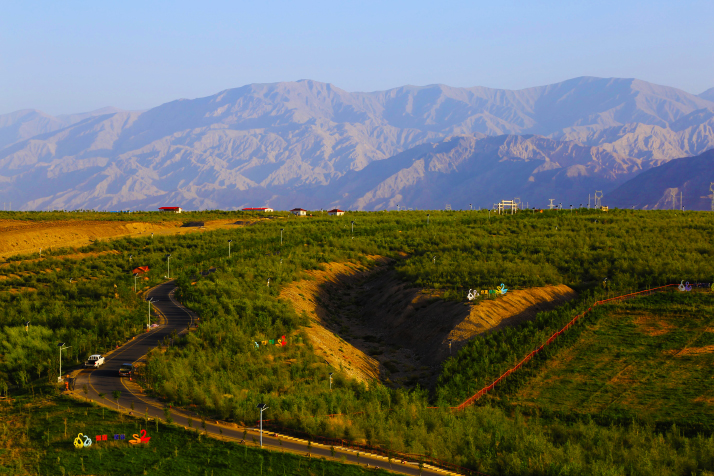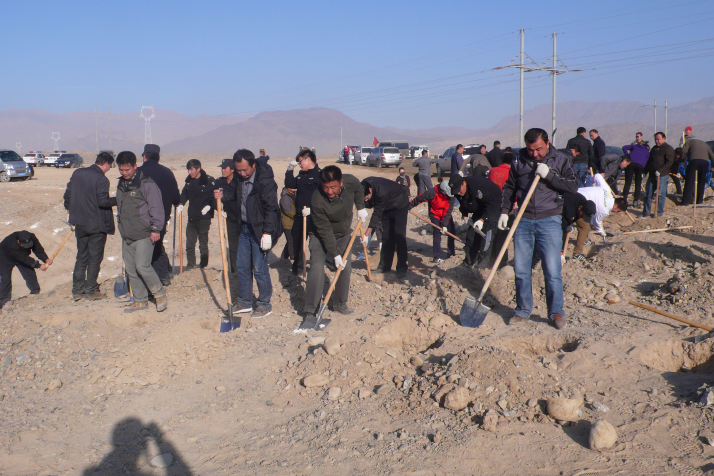|
||||||
|
||||||
| Home Nation World Business Opinion Lifestyle ChinAfrica Multimedia Columnists Documents Special Reports |
|
||||||
|
||||||
| Home Nation World Business Opinion Lifestyle ChinAfrica Multimedia Columnists Documents Special Reports |
| Nation |
| A Greener Outlook |
| Transformation to sustainable business improves a county's prospects |
| By Li Fangfang | NO. 49 DECEMBER 7, 2017 |
 An aerial view of the Beishan Mountain after its transformation, taken in 2017 (COURTESY PHOTO)
Han Guocheng used to feel guilty and worry about being punished as his firm engaged in resource exploitation. These days though, having transitioned from gold digger to environment protector over the past decade, he feels at ease. "Now I earn only 15 percent of my former income, but frankly speaking, I feel more fulfilled than I did in the past," Han told Beijing Review. Struggling to change The 30-something relocated some 300 km south from Urumqi, capital of northwest China's Xinjiang Uygur Autonomous Region, to the region's Hejing County in 2006, lured by the prospect of the windfall profits to be scooped up in the sand and gravel excavation business. Located on a barren mountain named Beishan, scattered with massive amounts of loose stone, the factory Han was going to help manage was one of around a dozen such facilities in the area operating day and night to source sand and gravel for the construction industry across Hejing and neighboring counties. As the county's real estate boom picked up steam around 2007, fueling demand for such materials, the factory, leased by Han's father since 2002, raked in a handsome annual profit of 3-4 million yuan ($455,000–606,000) at its peak. Yet circumstances were far from ideal. The county seldom experienced sand storms, according to Hejing county official Qing Long. However, Beishan's transformation from barren landscape to sand and gravel source had a detrimental effect, often inundating the county's main residential center, 6 km away, with wind-blown sand. Finding the windowsills of his home thickly coated in sand, Han knew the cause. But he felt reluctant to forgo such significant profits, as did his 62-year-old father, who was fast approaching retirement at the time. Unlike his father, however, the junior Han saw an opportunity to develop a more environmentally sustainable business. Pressured by fines imposed by the local environmental bureau from time to time and also feeling guilty about damaging the environment, Han decided to try a new venture by taking advantage of government financial and policy incentives for firms involved in tourism and other environmentally friendly industries. In 2011, he started planting commercially valuable trees on the mountain and tried to persuade his father to join him in the new activity. But viewing it in the light of his business experience—in which tree planting cost money and was not profitable—the senior Han remained unconvinced. Even if they could relocate rather than close the factory, he considered it a bad deal due to the large costs the move would incur. "Most people only saw the cost of ecological protection, but not the profit produced by a good environment," Qing told Beijing Review. Even putting aside his father's intransigence, the son felt he was initially facing a formidable challenge. "Plants can hardly survive in the Gobi desert," he said. "I almost have never seen any plants [naturally occurring] there in the past 12 years. No one believed that we could succeed [back] then." The first year's investment was in vain. The problem was that the soil around the Beishan Mountain was unsuitable for growing plants due to its natural chemical composition. So, as an experiment, Han replaced it with earth transported from another site nearby and planted more saplings the following year. This time, the young trees survived. But, as this approach cost 7,000–10,000 yuan ($1,060–1,514) per mu (0.0667 hectares), it was too expensive to be applied on a larger scale. Meanwhile, the county government decided in 2013 to solve the environmental problem caused by the resource exploitation around Beishan. In order to find a cost-effective way forward, Hejing County Party Secretary Zhao Wenji invited forestry experts to look into the matter and propose solutions. The local authority also hired Han Guocheng as a consultant on the basis of both his tree planting trial and familiarity with the area. Together, Zhao and Han experimented further to see whether there was any way for plants to survive and grow in the existing soil. Their hypothesis was that appropriate watering of the land might serve to drain from the topsoil the chemical compounds that would otherwise harm plant life. "The results showed that all the chemicals floated down, which meant that trees could live," Han said. The discovery by local people of tree roots in the ground covering the mountain lent credence to the experimental results, as it showed that such plants had actually grown there at some point in the past.  Hejing County Party Secretary Zhao Wenji (front, middle) prepares the ground for tree planting together with other local officials in November 2013 (COURTESY PHOTO)
Just do it Following the successful outcome of the field trial, the local government launched a project in 2013 to turn 30 square km of Beishan Mountain green. The first task was to solve the problem of water shortage. Fortunately, an adequate supply could be ensured by piping water from a river named Huangshuigou located 12 km away. Given the scarcity of the natural resource, the efficient use of the resources was a priority. "Water resources in Xinjiang are very precious. We must conserve every drop of water," Zhao said. With the major technical hurdle overcome, the environmental transformation project got underway in 2013 with all of the sand and gravel excavation activities around Beishan being relocated to another district some 30 km away. Over the following four years, the local government called on all of the county's civil servants to participate in a total of eight campaigns to remove stones from the landscape and plant trees. Traditionally, planting took place in the county only in spring. Zhao suggested trying autumn planting. Initially, nobody believed that it would work, but it turned out to be successful. "When I first came to Beishan in autumn 2013, it was all big stones, without a single tree or bird. We even had no place to hide from the burning sun," said Su Jinjin, Director of the Beishan Administration Commission. Su was among one of the first batches of officials who pioneered the development of Beishan. He spent every weekend of the past several years removing stones from the ground and planting and watering trees. Su actually doubted whether the project would work until he saw 95 percent of the trees planted in 2013 survive to the following year. "Our hard work paid off. All of the participants felt encouraged, [and instead of] being ordered to plant trees, they took the initiative to do it," Su said. Twice-yearly planting made it possible for the project to completely accomplish its afforestation objective by this year, turning 30 square km of barren mountainside green by planting 4.38 million trees in total, by which the number of sandy and dusty days has been decreased from 30 days four years ago to less than 20 days currently. The area has since been designated a national scenic spot. Harvest time Besides the new forest, the Beishan project features a 20-square-km complex comprising tourism, cultural and educational facilities. For people living elsewhere in the region, it is becoming a popular weekend getaway destination, where they can enjoy hiking, fishing, fruit picking and outdoor barbecues, among other leisure activities. Local residents, meanwhile, have the new Beishan Square in which to exercise or take part in group dances against a backdrop of black swans gliding gracefully across a lake. So far, Beishan has received 960,000 visitors, generating more than 500,000 yuan ($75,700) in revenue, according to the county government. Han currently owns an agritourism hotel on Beishan, which looks set to provide him with a stable income. "I earn much less than before. But this is sustainable," Han said. "My daughter never liked to come to my factory in the past. But now, I live on the mountain, and my daughter plays outside all day and won't come home until we ask her to," Han said. Han's father also enjoys the new lifestyle very much. "He has changed a lot," Han said. "He is proud when he explains [to other people] what we have done here." Beishan's development has also brought economic opportunities for local residents, particularly those living in poverty, by creating many new jobs, including in cleaning, gardening and farming. In addition to an average monthly income of 2,400 yuan ($363.6), employees can also benefit from rent-free space for their own commercial activity as well as newly constructed dormitory accommodation. Kasim Zaydin, 47 years old, and his wife are among the 251 locals who have been employed in the complex to date. The two, who also operate a barbecue stall in Beishan, now enjoy a combined total income of 6,000 yuan ($909) a month. The Beishan project is currently developing all kinds of tourism services. According to plans for the complex, it should be able to provide as many as 2,000 jobs when it reaches full operating mode in two or three years. "It integrates ecological protection and job opportunities. People here feel more happiness, all because Beishan Mountain has turned green," Zhao said. (Reporting from Hejing, Xinjiang Uygur Autonomous Region) Copyedited by Chris Surtees Comments to ffli@bjreview.com |
About Us | Contact Us | Advertise with Us | Subscribe
|
||
| Copyright Beijing Review All rights reserved 京ICP备08005356号 京公网安备110102005860号 |